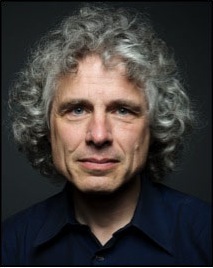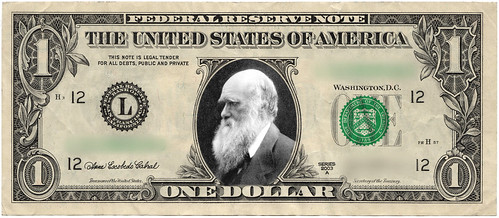
A
critical comment on one of my posts raises the following issue:
In A Devil's Chaplain wrote that humans (and only humans) have the gift of foresight "something utterly foreign to the blundering short-term ways of natural selection."
Utterly foreign. In the BBC Profiles video while promoting the book he said "The human brain is the only possible engine of departure from Darwinian principles, and it really is."
Dawkins and Dennett (in lecture and interview) both acknowledge that humans "are the only/first intelligent designers on the tree of life." As I have said previously the question is no longer design (which evolution is the answer to) but drive. What are the causal forces that move humans, and their thought around?
The thing is, the human brain itself works on Darwinian principles. Its components use copying ubiquitously (signals are copied whenever an axon branches), and there's variation of what is copied plus selection. Ideas evolve
within minds during
individual learning, just as they evolve
between minds during
social learning. Copying, variation and selection are the basic ingredients of Darwinian evolution, according to many formulations of it - so the brain evolves along Darwinian lines.
Within-brain Darwinism was worked out by Campbell, Skinner, Changeux, Edelman, Szathmáry and Calvin - and has been popularized by Cziko, Plotkin, Dennett and myself, among others. In short, the brain is a Darwin machine.
B. F. Skinner was one of those who pioneered this view, making the analogy between Darwinian evolution and learning explicit. He used the term "extinction" to refer to the obliteration of memories - usage that persists in psychology to this day.
This within-brain evolution is a fundamental part of universal Darwinism.
No doubt the remaining critics will say that within-brain selection is deliberative selection. However, we have deliberative selection in common-or-garden evolution as well - it's called mate choice, or sexual selection. No doubt critics will say that within-brain variation is composed of directed mutations. However both evolutionary theory and Darwinism are cool with directed mutations. The various definition(s) of "evolution" typically make no mention of the source of variation, they just say that it needs to exist. As for Darwin, he understood relatively little about how variation arose. He had some theories, but largely knew that he didn't know. Directed mutations might well be contrary to neo-Darwinism, but that's a very different ball-game.
Many critics don't have a proper appreciation of the issue of Darwinian evolution within the brain. They think that intelligent design represents a radical departure from evolution. What they don't grasp is that the brain evolves at high speed, and its productions are the result of many generations of reproduction, variation and selection of signals and ideas. Brains are a neat invention, but they still work on evolutionary principles.
Also, for many years, most of the researchers in cultural evolution didn't understand within-brain evolution either. The individual learning folk and the social learning folk came from different disciplines - and it took a while for them to find each other, swap notes and get onto the same page.
Here's an example of this misunderstanding in action among researchers generally sympathetic towards an expanded domain for Darwinism:
A number of other nonselective processes may affect the evolution of ideas. For example, people can learn an idea from others and then innovate, modifying the idea in an effort to improve it. Still other nonselective processes can arise when people synthesize their own beliefs after being exposed to a number of people who behave differently.
Here learning and critical evaluation are described as being "nonselective processes" - when it is now evident that any proper understanding of them would involve considerable quantity of selection
between ideas inside minds.
Today, understanding of within-brain evolution lags behind understanding of cultural evolution - which itself remains poorly understood. Universal Darwinism is an even-less-well-understood fourth stage in the evolution revolution.
As for the idea that "humans (and only humans) have the gift of foresight", that is just daft. All animal brains forecast the future consequences of their actions, in order to allow them to choose between them. That's the basis of the memory-prediction framework.
Lastly, it is Darwinian evolution within the brain that represents the primary conceptual link between evolutionary theory and machine intelligence.
References
- Calvin, William H. (1987) The brain as a Darwin Machine.
- Plotkin, Henry (1994) Darwin Machines and the Nature of Knowledge.
- Skinner, B. F. (1953) Science and Human Behavior.
- Calvin, William H. (1998) The Cerebral Code: Thinking a Thought in the Mosaics of the Mind.
- Edelman, Gerard (1987) Neural Darwinism: The Theory Of Neuronal Group Selection.
- Changeux, Jean-Pierre (1983) L'Homme Neuronal.
- Harold P. de Vladar, Eörs Szathmáry (2015) Neuronal boost to evolutionary dynamics
- Fernando C, Szathmáry E, Husbands P. (2012) Selectionist and evolutionary approaches to brain function: a critical appraisal.
- Fernando C, Vasas V, Szathmáry E, Husbands P. (2011) Evolvable neuronal paths: a novel basis for information and search in the brain. PLoS ONE 6, e23534.
- Fernando, Chrisantha, Karishma, K.K. and Szathmáry, Eörs (2008) Copying and Evolution of Neuronal Topology. PLoS ONE 3 (11): 3775.
- Fernando, Chrisantha and Szathmáry, Eörs (2009) Chemical, Neuronal, and Linguistic Replicators.
- Fernando C, Szathmáry E. (2010) Natural selection in the brain. In Toward a theory of thinking (eds B Glatzeder, V Goel, A von Müller), pp. 291–340. Berlin, Germany: Springer.
- Fernando, Chrisantha, Goldstein, R. and Szathmáry, Eörs (2010) The Neuronal Replicator Hypothesis. Neural Computation 22 (11): 2809–2857.
- Fernando, Chrisantha (2010) Neuronal replicators solve the stability-plasticity dilemma. GECCO 2010: 153-154.
- Fernando, Chrisantha, Vasas, Vera, Szathmáry, Eörs and Husbands, Philip (2011) Natural Selection of Paths in Networks.
 While I've long
While I've long  Laor and Jablonka devote much of their review of
Laor and Jablonka devote much of their review of  Alan wrote something odd about memes in
Alan wrote something odd about memes in  I favour using inclusive fitness - in place of individual fitness - in most places where the concept is used. Individual fitness just isn't
I favour using inclusive fitness - in place of individual fitness - in most places where the concept is used. Individual fitness just isn't 
 The idea of
The idea of  Age-old sceptic about cultural evolution, Steven Pinker
Age-old sceptic about cultural evolution, Steven Pinker
 Evolutionary ontogeny is formed from the union of
Evolutionary ontogeny is formed from the union of  In
In  There's a new article on memetics by Michael Greenker:
There's a new article on memetics by Michael Greenker:  Thumbs up from me for Razib Khan for his recent posts dinging most cultural-anthropology
Thumbs up from me for Razib Khan for his recent posts dinging most cultural-anthropology  Universal Darwinism leads to some ideas about values, goals and optimization targets:
Universal Darwinism leads to some ideas about values, goals and optimization targets: Someone tried
Someone tried  From
From  A
A